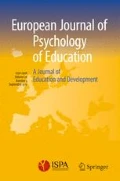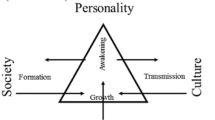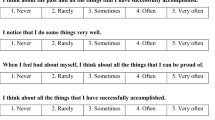Abstract
A programme to enhance first-year college students’ self-regulated learning strategies is proposed and assessed in two samples, one from the University of Oviedo (Spain) and the other from the University of Minho (Portugal). Each sample was divided into two groups (experimental and control). The Spanish sample comprised 44 students in the experimental group and 40 in the control group, whereas in the Portuguese sample, the number of students was 48 and 44, respectively. The narrative-based intervention programme is organised around a set of fictional letters from a first-year college student in which he reports his own academic experiences. Each letter focuses on a learning strategy as an opportunity to teach and enhance the students’ deep approaches to learning and their self-regulated learning processes. In both samples, findings confirm the programme efficacy to teach efficient learning strategies and to promote self-regulation. Implications for college students and for teaching are discussed.
Similar content being viewed by others
References
Biggs, J. (1987). Student approaches to learning and studying. Melbourne: Australian Council for Educational Research.
Biggs, J. B. (1985). The role of metalearning in study processes. British Journal of Education Psychology, 55, 185–212.
Biggs, J. B. (1993). What do inventories of students’ learning processes really measure? A theoretical review and clarification. British Journal of Educational Psychology, 63, 3–19.
Biggs, J., Kember, D., & Leung, D. Y. (2001). The revised two factor study process questionnaire: R-SPQ-2F. British Journal Educational Psychology, 71, 133–149.
Boekaerts, M., & Cascallar, E. (2006). How far have we moved toward the integration of theory and practice in self-regulation? Educational Psychology Review, 18, 199–210.
Boekaerts, M., & Corno, L. (2005). Self regulation in the classroom: A perspective on assessment and intervention. Applied Psychology: An International Review, 54(2), 199–231.
Boekaerts, M., Pintrich, P. R., & Zeidner, M. (Eds.). (2000). Handbook of self-regulation. San Diego: Academic.
Cano, F. (2007). Approaches to learning and study orchestrations in high school students. European Journal of Psychology of Education, 2, 131–151.
Case, J., & Gunstone, R. (2002). Metacognitive development as a shift in approach to learning: An in-depth study. Studies in Higher Education, 27, 459–470.
Cleary, T., & Zimmerman, B. (2004). Self-regulation empowerment program: A school-based program to enhance self-regulated and self-motivated cycles of student learning. Psychology in the Schools, 41(5), 537–550.
De la Fuente, J., Pichardo, M. C., Justicia, F., & Berbén, A. (2008). Learning approaches, self-regulation and achievement in three European universities. Psicothema, 20, 705–711.
Diseth, A. (2007). Approaches to learning, course experience and examination grade among undergraduate psychology students: Testing of mediator effects and construct validity. Studies in Higher Education, 32, 373–388.
Entwistle, N. J., & Ramsden, P. (1983). Understanding student learning. London: Croom Helm.
Entwistle, N., McCune, V., & Walker, P. (2001). Conceptions, styles, and approaches within higher education: Analytic abstractions and everyday experience. In R. J. Sternberg & L. F. Zhang (Eds.), Perspectives on thinking, learning, and cognitive styles (pp. 103–136). Mahwah: Erlbaum.
Hattie, J., Biggs, J., & Purdie, N. (1996). Effects of learning skills interventions on student learning: A meta-analysis. Review of Educational Research, 66(2), 99–136.
Heikkila, A., & Lonka, K. (2006). Studying in higher education: Students’ approaches to learning, self-regulation, and cognitive strategies. Studies in Higher Education, 31, 99–117.
Justicia, F., Pichardo, M. C., Cano, F., Berbén, A., & De la Fuente, J. (2008). The revised two-factor study process questionnaire (R-SPQ-2F): Exploratory and confirmatory factor analyses at item level. European Journal of Psychology of Education, 3, 355–372.
Lonka, K., Olkinuora, E., & Mäkinen, J. (2004). Aspects and prospects of measuring studying and learning in higher education. Educational Psychology Review, 16(4), 301–323.
Marton, F. (1981). Phenomenografy: Describing conceptions of the world around us. Instructional Science, 10, 177–220.
Marton, F., & Säljö, R. (1976). On qualitative differences in learning-I: Outcome and process. British Journal of Educational Psychology, 46, 4–11.
Marton, F., Hounsell, D., & Entwistle, N. (Eds.). (1997). The experience of learning. Edinburgh: Scottish Academic Press Limited.
Núnez, J. C., González-Pienda, J., Solano, P., & Rosário, P. (2006). Self-regulation processes measurement through self-report methodology. Psicothema, 18(3), 353–358.
Pintrich, P. (2004). A conceptual framework for assessing motivation and self-regulated learning in college students. Educational Psychology Review, 16(4), 385–407.
Pintrich, P. R., & De Groot, E. (1990). Motivational and self-regulated learning components of classroom academic performance. Journal of Educational Psychology, 82, 33–40.
PISA. (2006). Retrieved August 11, 2008 from http://www.pisa.oecd.org.
Prosser, M., & Trigwell, K. (2000). Understanding learning and teaching—The experience in higher education. Buckingham: Open University Press.
Rosário, P., Núñez, J. C., González-Pienda, J. A., Almeida, L., Soares, S., & Rúbio, M. (2005). The academic learning viewed from the perspective of John Biggs’ 3P model. Psicothema, 17, 20–30.
Rosário, P., Núnez, J., and González-Pienda, J. (2006). Comprometer-se com o estudar na Universidade: “Cartas do Gervásio ao seu Umbigo”. Almedina.
Rosário, P., Mourão, R., Núñez, J. C., González-Pienda, J. A., Solano, P., & Valle, A. (2007). Evaluating the efficacy of a program to enhance college students’ self-regulation learning processes and learning strategies. Psicothema, 19, 422–427.
Rosário, P., Mourão, R., Núñez, J. C., González-Pienda, J. A., & Solano, P. (2008). Storytelling as a promoter of self-regulated learning (SRL) throughout schooling. In A. Valle, J. C. Núñez, R. G. Cabanach, J. A. González-Pienda, & S. Rodríguez (Eds.), Handbook of instructional resources and their applications in the classroom (pp. 107–122). New York: Nova Science.
Säljö, R. (1979). Learning in the learner’s perspective. I. Some common-sense conceptions, Report No. 76. Göteborg: University of Göteborg, Institute of Education.
Schraw, G., Crippen, K., & Hartley, K. (2006). Promoting self-regulation in Science education: Metacognition as part of a broader perspective on learning. Research in Science Education, 36, 111–139.
Schunk, D. H. (1996). Goal and self-evaluative influences during children’s cognitive skill learning. American Educational Research Journal, 33, 359–382.
Schunk, D. H., & Zimmerman, B. J. (1998). Conclusions and future directions for academic interventions. In D. H. Schunk & B. J. Zimmerman (Eds.), Self-regulated learning. From teaching to self-reflective practice (pp. 225–234). Hillsdale: Erlbaum.
Shuell, T. J. (1986). Cognitive conceptions of learning. Review of Educational Research, 56, 411–436.
Simons, J., Dewitte, S., & Lens, W. (2004). The role of different types of instrumentality in motivation, study strategies, and performance: Know why you learn, so you’ll know what you learn! British Journal of Educational Psychology, 74, 343–360.
Simpson, M., Hynd, C., Nist, C., & Burrel, K. (1997). College academic assistance programs and practices. Educational Psychology Review, 9, 39–87.
Trigwell, K., & Prosser, M. (1991). Relating approaches to study and the quality of learning outcomes at the course level. British Journal of Educational Psychology., 61, 265–275.
Valle, A., Núñez, J. C., Cabanach, R. G., González-Pienda, J. A., Rodríguez, S., Rosário, P., et al. (2008). Self-regulated profiles and academic achievement. Psicothema, 20, 724–731.
VanderStoep, S., & Pintrich, P. (2007). Learning to learn: the skill and will of college success, 2 ed.. New York: Prentice Hall.
Watkins, D., & Biggs, J. (1996). The Chinese learner: Cultural, psychological and contextual influences. Hong Kong: Cerc and Acer.
Weinstein, C. E., Husman, J., & Dierking, D. (2000). Self-regulation intervention with a focus on learning strategies. In M. Boekaerts, P. Pintrich, & M. Zeidner (Eds.), Handbook of self-regulation (pp. 727–747). New York: Academic.
Zimmerman, B. J. (2000). Attaining self-regulation. A social cognitive perspective. In M. Boekaerts, P. Pintrich, & M. Zeidner (Eds.), Handbook of self-regulation (pp. 13–39). New York: Academic.
Zimmerman, B. J. (2002). Becoming a self-regulated learner: An overview. Theory Into Practice, 41(2), 64–70.
Zimmerman, B. J., & Martinez-Pons, M. (1986). Development of a structured interview for assessing student use of self-regulated learning strategies. American Educational Research Journal, 23, 614–628.
Zimmerman, B. J., & Martinez-Pons, M. (1988). Construct validation of a strategy model of student self-regulated learning. Journal of Educational Psychology, 80, 284–290.
Author information
Authors and Affiliations
Corresponding author
Additional information
Pedro Rosário. Psychology Department of University of Minho, Campus de Gualtar, 710-057, Braga, Portugal. E-mail: prosario@iep.uminho.pt; Web site: www.iep.uminho.pt, www.guia-psiedu.com
Current themes of research:
Self-regulated learning. Programs to enhance self-regulation. Study skills and approaches to learning. Homework.
Most relevant publications in the field of Psychology of Education:
Rosário, P., Mourão, R., Núñez, J. C., González-Pienda, J. A., & Solano, P. (2008). Storytelling as a promoter of Self-Regulated Learning (SRL) throughout schooling. In A. Valle, J. C. Núñez, R. G. Cabanach, J. A. González-Pienda, & S. Rodríguez (Eds.), Handbook of instructional resources and their applications in the classroom (pp. 107–122). NY: Nova Science.
Rosário, P., Mourão, R., Núñez, J. C., González-Pienda, J. A., Solano, P., & Valle, A. (2007). Evaluating the efficacy of a program to enhance college students’ self-regulation learning processes and learning strategies. Psicothema, 19, 422–427.
Rosário,P., Costa, M., Núñez, J. C., González-Pienda, J., Solano, P., & Valle, A. (2009). Academic Procrastination: Associations with personal, school, and family variables. Spanish Journal of Psychology, 12(1), 118–127.
Rosário, P., Salgado, A., Núñez, J. C., González-Pienda, J., & Valle, A. (2008). Ansiedad ante los exámenes: relación con variables personales y familiares. Psicothema, 20(4), 563–570.
Rosário, P., Grácio, L., Núnez, J. C., & González-Pienda, J. (2007). Voix d’élèves sur l’apprentissage à l’entrée et à la sortie de l’université: un regard phénoménographique. Revue des Sciences de l’éducation, 3(1), 237–262.
José Carlos Núñez. Psychology Department of University of Oviedo, Plaza Feijoo s/n, 33003, Oviedo, España. E-mail: jcarlos@telecable.es; Web site: www.uniovi.es/zope/departamentos/Psicologia
Current themes of research:
Self-regulated learning. Motivation in higher education. Approaches to learning. Homework and school achievement. Assessment.
Most relevant publications in the field of Psychology of Education:
Núñez, J. C., Solano, P., González-Pienda, J., & Rosário, P. (2006). El aprendizaje autorregulado como medio y meta de la educación. Papeles del Psicólogo, 2(3), 139–146.
Núñez, J. C., González-Pienda, Bernardo, A., Alvarez, L., Rosário, P., Valle, A., Cabanach, R., Rodríguez, S., & Castejón, J. L. (2008). Intellectual Abilities, Thinking Styles, and Academic Achievement. In A. Valle, J. C. Núñez, R. G. Cabanach, J. A. González-Pienda, & S. Rodríguez (Eds.), Handbook of instructional resources and their applications in the classroom (pp. 45–66). NY: Nova Science.
Rosário, P., Mourão, R., Núñez, J. C., González-Pienda, J. A., & Solano, P. (2008). Storytelling as a promoter of Self-Regulated Learning (SRL) throughout schooling. In A. Valle, J. C. Núñez, R. G. Cabanach, J. A. González-Pienda, & S. Rodríguez (Eds.), Handbook of instructional resources and their applications in the classroom (pp. 107–122). NY: Nova Science.
Valle, A., Cabanach, R. G., Rodríguez, S., Núñez, J. C., González-Pienda, J. A., Solano, P., & Rosário, P. (2007). A motivational perspective on the self-regulated learning in higher education. In P. B. Richards (Ed.), Global issues in higher education (pp. 99–125). New York: Nova Science Publishers.
Valle, A., Núñez, J. C., Cabanach, R., González-Pienda, J., Rodríguez, S., Rosário, P., Cerezo, R., & Muñoz-Cadavid, M. (2008). Self-Regulated Profiles and Academic Achievement. Psicothema, 20(4), 724–731. (ISI Impact Factor, 0.965)
Julio González-Pienda. Psychology Department of University of Oviedo, Plaza Feijoo s/n, 33003, Oviedo, España. E-mail: julioag@uniovi.es; Web site: www.uniovi.es/zope/departamentos/Psicologia
Current themes of research:
Self-regulated learning. Family and school relations. Mathematics education. Motivation and school achievement.
Most relevant publications in the field of Psychology of Education:
González-Pienda, J., Núnez, J., Gonzalez-Pumarienga, S., Alvarez, L., Roces, C., González, P., Bernardo, A., Valle, A., Cabanach, R., Rodríguez, S., & Rosário, P. (2004). Estilos de Pensamiento: análisis de su validez estructural a través de las respuestas de adolescentes al Thinking Styles Inventory, Psicothema, 16(1), 139–148. (ISI Impact Factor, 0.965).
Núñez, J. C., González-Pienda, Bernardo, A., Alvarez, L., Rosário, P., Valle, A., Cabanach, R., Rodríguez, S., & Castejón, J. L. (2008). Intellectual Abilities, Thinking Styles, and Academic Achievement. In A. Valle, J. C. Núñez, R. G. Cabanach, J. A. González-Pienda, & S. Rodríguez (Eds.), Handbook of instructional resources and their applications in the classroom (pp. 45–66). NY: Nova Science.
Rosário,P., Costa, M., Núñez, J. C., González-Pienda, J., Solano, P., & Valle, A. (2009). Academic Procrastination: Associations with personal, school, and family variables. Spanish Journal of Psychology, 12(1), 118–127. (ISI Impact Factor, 0.558).
Valle, A., Cabanach, R. G., Rodríguez, S., Núñez, J. C., González-Pienda, J. A., Solano, P., & Rosário, P. (2007). A motivational perspective on the self-regulated learning in higher education. In P. B. Richards (Ed.), Global issues in higher education (pp. 99–125). New York: Nova Science Publishers.
Núñez, J. C., Solano, P., González-Pienda, J., & Rosário, P. (2006). El aprendizaje autorregulado como medio y meta de la educación. Papeles del Psicólogo, 2(3), 139–146.
António Valle. Department of Developmental and Educational Psychology, University of A Coruña, Campus de Elviña, 15071, A Coruña, España. E-mail: vallar@udc.es; Web site: http://www.udc.es/dep/psee
Current themes of research:
Goals. Self-regulated learning. Higher education. School achievement.
Most relevant publications in the field of Psychology of Education:
Valle, A., Cabanach, R. G., Rodríguez, S., Núñez, J. C., González-Pienda, J. A., Solano, P., & Rosário, P. (2007). A motivational perspective on the self-regulated learning in higher education. In P. B. Richards (Ed.), Global issues in higher education (pp. 99–125). New York: Nova Science Publishers.
Valle, A., Núñez, J. C., Cabanach, R., González-Pienda, J., Rodríguez, S., Rosário, P., Cerezo, R., & Muñoz-Cadavid, M. (2008). Self-Regulated Profiles and Academic Achievement. Psicothema, 20(4), 724–731.
Valle, A., Núñez, J. C., Cabanach, R., González-Pienda, J., Rodríguez, S., & Rosário, P. (2009). Academic Goals and Learning Quality in Higher Education Students. Spanish Journal of Psychology, 12(1), 96–105.
Valle, A., Núñez, J. C., Cabanach, R., Rodríguez, S., González-Pienda, J., & Rosário, P. (2009) Perfiles Motivacionales en Estudiantes de Secundaria: Análisis Diferencial en Estrategias Cognitivas, Estrategias de Autorregulación y Rendimiento Académico. Revista Mexicana de Psicología, 26 (1), 113–124.
Valle, A., Cabanach, R. G., Núñez, J. C., González-Pienda, J. A., Rodríguez, S., & Piñeiro, I. (2003). Multiple goals, motivation and academic learning. British Journal of Educational Psychology, 73, 71–87.
Luísa Trigo. Psychology Department of University Católica Portuguesa, Rua Diogo Botelho 1327, 4169 - 005 Porto, Portugal. E-mail: mtrigo@porto.ucp.pt; Web site: http://www.porto.ucp.pt, www.guia-psiedu.com
Current themes of research:
Self-regulated learning. Approaches to learning. Higher education.
Carina Guimarães. Psychology Department of University Beira Interior, Convento de Sto. António, 6201-001 Covilhã, Portugal. E-mail: scmg@ubi.pt; Web site: http://www.ubi.pt, www.guia-psiedu.com
Current themes of research:
Self-regulate learning. Approaches to learning. Higher education.
Most relevant publications in the field of Psychology of Education:
Rosário, P., Almeida, L. S., Guimarães, C., Faria, A., Prata, L., Dias, M., & Nuñez, C. (2001). Como enfrentam os alunos universitários as suas tarefas académicas? Um enfoque sobre o ano escolar e a sua relação com o rendimento escolar. Revista Galego-Portuguesa de Psicoloxia e Educación, 5(7), 429–437.
Rosário, P., Almeida, L. S., Guimarães, C., & Pacheco, M. (2001). Como estudam os alunos de elevado rendimento académico? Uma análise centrada nas estratégias de auto-regulação. Sobredotação, 2(1), 103–116.
Rosário, P., Trigo, J., & Guimarães, C. (2003). Estórias para estudar, histórias sobre o estudar: narrativas auto-regulatórias na sala de aula. Revista Portuguesa de Educação, 16(2), 117–133.
This study was supported, in Portugal, partially by a grant of Fundação para a Ciência e a Tecnologia/Foundation for Science and Technology, Portugal (PTDC/CED/66503/2006) to the first author, and in Spain by the Ministerio de Educación y Ciencia/Education and Science Ministry (MEC06-SEJ2006-08814) to the second author.
Rights and permissions
About this article
Cite this article
Rosário, P., Núñez, J.C., González-Pienda, J. et al. Enhancing self-regulation and approaches to learning in first-year college students: a narrative-based programme assessed in the Iberian Peninsula. Eur J Psychol Educ 25, 411–428 (2010). https://doi.org/10.1007/s10212-010-0020-y
Received:
Revised:
Published:
Issue Date:
DOI: https://doi.org/10.1007/s10212-010-0020-y




